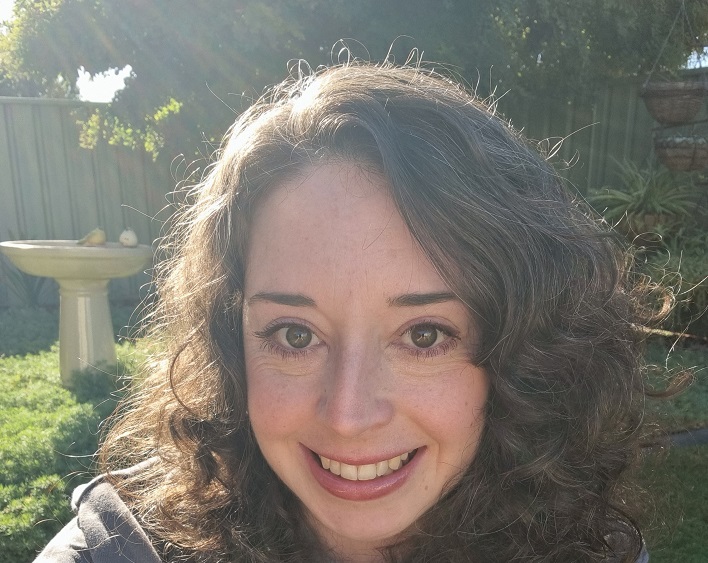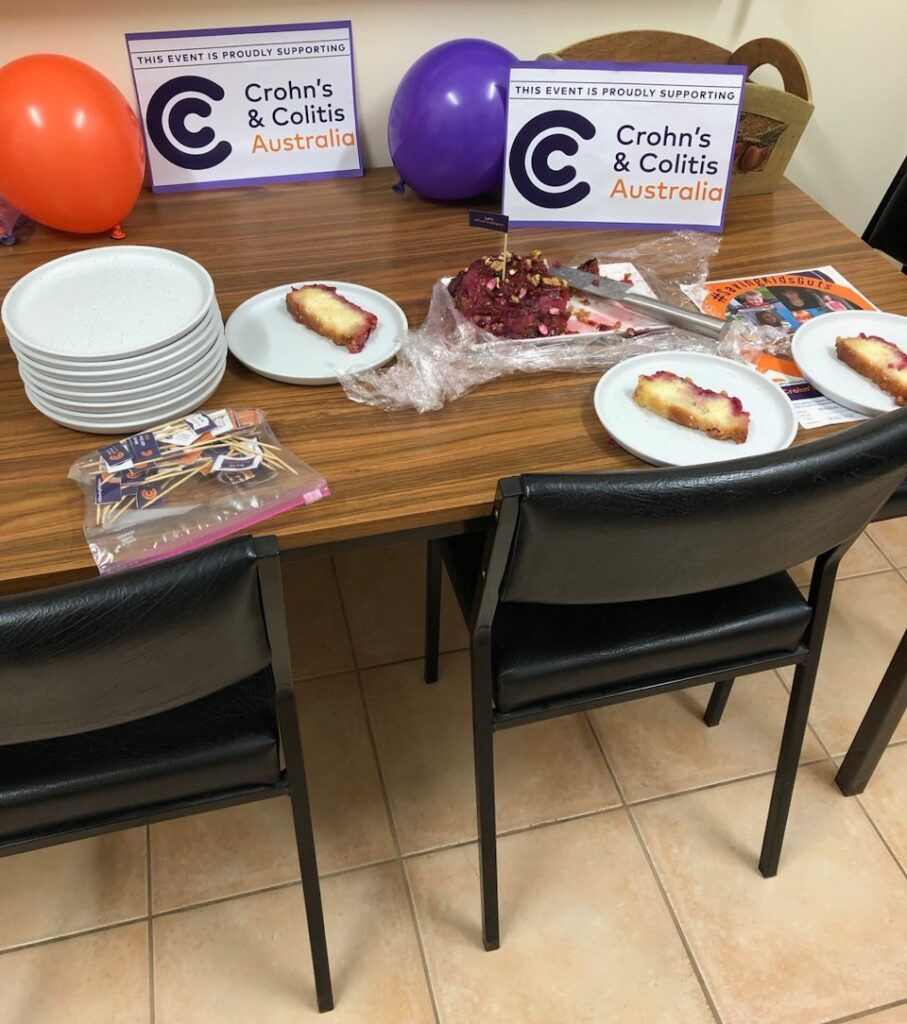“Your health journey is unique, and you deserve to be heard and supported” – Fiona’s story

Before my diagnosis, Crohn’s Disease and ulcerative colitis were unfamiliar terms to me. I had never encountered someone with these conditions until recently. Many people around me knew of someone affected by these conditions, but few truly understood the daily impact they can have. Personally, living with Inflammatory Bowel Disease (IBD) has been especially challenging while living in rural areas, where access to specialised care and support can be limited.
Motivated to raise awareness and share my journey, I organized a morning tea event with the support of my employer. Despite living in a rural community, the turnout was encouraging. It was heartening to see people come forward to discuss their own struggles with gut health and their experiences supporting loved ones with IBD.
Like many others, my journey has been a long one. Throughout my childhood, I often found myself feeling unwell. I remember the sentence “Fiona is sick again” echoing more frequently with me than for the rest of my siblings combined. Back then, it was often attributed to having a sensitive stomach. As I grew older, being unwell became a regular part of life. With my father being a GP, I assumed any serious health issues would be recognized early.
At 17, due to various challenges at home, I moved out and had to learn self-care. It was during that time that I noticed my stomach becoming increasingly unsettled. I frequently arrived late to work, parties, or social events, and often left early due to severe stomach pain, bloating, nausea, vomiting, or diarrhea. These symptoms caused significant fluctuations in my weight, leaving me constantly exhausted. Seeking answers, I visited a GP who diagnosed me with IBS, attributing it to anxiety or depression related to my home environment. While I hadn’t anticipated a mental health diagnosis, I trusted the medical expertise given my circumstances.
Shortly after starting university, I worked tirelessly to make ends meet. Over time, my stomach issues worsened significantly. I frequently found myself rushing out of classes, sweating and in pain, fearing I wouldn’t make it to the restroom in time. The frequent exits, often from the front of the class, became increasingly embarrassing. Being the only student with such regular interruptions made returning to my seat incredibly awkward. I continued to visit my GP regularly as my symptoms persisted, insisting on every possible test. Each result came back normal, leading my GP to suggest that it was all in my head. I was referred to psychologists to manage what was thought to be anxiety and stress.

In 2009, at 20, I experienced my first instance of blood in the toilet, a terrifying moment. It prompted my first endoscopy and colonoscopy, scheduled months away due to the lengthy waitlist in the public healthcare system. Despite my relief at being taken seriously, the procedures showed nothing significant except for helicobacter. This reinforced the belief that my symptoms were attributed to IBS and anxiety. I received frequent advice ranging from eating well, to exercising, meditation, practicing yoga, and ensuring good sleep to alleviate symptoms. Referrals to psychologists and psychiatrists were also part of these ongoing recommendations, yet despite diligently following these strategies, relief remained elusive.
My brother later encouraged me to check for gallstones as it ran in the family and the symptoms seemed to line up. This was regularly dismissed because I looked “healthy” despite feeling like I was dying on the inside. The GP indicated I didn’t fall into the normal category and tests were otherwise normal. After some convincing they gave in and did some scans. To their surprise they saw gallstones and I was put on the urgent list to have it removed. I was only 22 at the time. I remember the surgeon telling me that my gallbladder was so infected and full of small stones that they couldn’t count how many there were. I thought this was going to be the end of my journey, but I was wrong.
After a brief period of respite, my symptoms resurfaced. The GP reaffirmed that it was IBS and referred me to a dietitian to manage problematic foods. I began following a low-FODMAP diet, but despite strict adherence, symptoms persisted. After 18 months of trial and error, the dietitian suggested combining an elimination diet with low-FODMAP. Those familiar with these diets know how restrictive they are when combined. This marked the beginning of my struggle with food. I couldn’t trust anything not prepared by myself, fearing it could trigger sickness. Dining out or traveling became sources of embarrassment, as I felt burdensome trying to accommodate my dietary needs. Eating became a chore, often done alone, as everything tasted bland, and I meticulously recorded every meal and its effects on my symptoms
My preoccupation with food intensified as I became convinced that I might have inadvertently contaminated it or consumed something high in substances that I was sensitive to. Each time symptoms appeared, I felt like I had failed and needed to restart the process. Consequently, I never strayed from those restrictive diets. Eventually, it became easier to avoid eating altogether, especially around scheduled social or work events. Over time, I experienced more frequent episodes of bleeding during trips to the toilet. On two separate occasions, I sought emergency care, feeling anxious and in pain. However, I endured lengthy waits in the waiting room or was advised to consult my GP later as my condition was deemed non-urgent. My GP subsequently arranged another colonoscopy in 2014, but once again, the results yielded no significant findings.
The frequency and urgency of my bathroom visits intensified despite my efforts, including consultations with a dietitian and psychologist. I found myself rushing to the restroom a dozen times or more daily. This disrupted my work meetings, site visits, social gatherings, and even job interviews, causing me considerable stress and embarrassment. Special occasions were particularly challenging. During my bachelorette party, I experienced a panic attack, overwhelmed by the fear of eating in front of others and needing frequent bathroom breaks without anyone noticing. On my wedding day, I contemplated cancelling as I made eight trips to the restroom within a couple of hours while getting ready. I arrived at the altar 45 minutes late, visibly distressed and in pain, which is evident in some of the photos from that day.
In my thirties, my health deteriorated further. I was constantly overheating, and dining with others was uncomfortable as the smell of food made me nauseous. Eating itself became painful, and consuming anything ‘wrong’ would immediately send me rushing to the bathroom. This reinforced my belief that skipping meals altogether was easier. Within weeks, I had another episode of bleeding and unintentionally lost 12kg. During this time, one specialist’s frustration was palpable; they insisted I needed better control over my bowels and to exert more effort. It was a crushing experience, feeling utterly controlled by my condition and helpless to change it. I was on the verge of giving up when a friend encouraged me to persist and suggested exploring private healthcare options instead of relying on the public system.
When I visited another GP for a second opinion with my additional symptoms, they conducted a blood test that revealed unexpectedly high iron levels. This was unusual because I had stopped consuming red meat, and typically my iron levels were low. The GP speculated that inflammation might be the cause. They provided me with a copy of these results. This discovery marked a turning point for me, prompting me to intensify my efforts in seeking answers and understanding the underlying issues affecting my health.
My regular GP was hesitant to proceed with another colonoscopy, citing previous findings that appeared normal on the surface. Despite their reservations, I insisted on further investigation and managed to schedule my third colonoscopy by the age of 32, this time through the private healthcare system. To my surprise, I was able to get an appointment within a couple weeks. Following the procedure, my gastroenterologist awakened me with unexpected news: I had numerous ulcers and inflammation which was chronic in my terminal ileum, but with the absence of strictures. This led to a diagnosis of Crohn’s disease. Overwhelmed with a mix of emotions, I wept for a long time — finally receiving validation and someone who believed in my experiences.
After receiving the Crohn’s disease diagnosis, anger surged through me as I struggled to comprehend why it had been overlooked for so long. I confronted my GP, expressing my frustration over being misdiagnosed twice (first with gallstones). Surprisingly, my GP offered a sincere apology that helped me come to terms with the situation and move forward. I understand it wasn’t entirely their fault; everything appeared normal on the surface, and I somehow slipped through the cracks of the healthcare system. I also discussed this with my dad, questioning why he hadn’t noticed earlier signs when I was younger. He explained that despite my frequent illnesses, I always managed to function, and there were no obvious indicators like blood in the toilet. He speculated that I might have experienced periods of natural remission before receiving medical attention through the public healthcare system, which often involves lengthy waits.
After navigating through waves of emotions and grieving for the lost years, I began planning how to improve my health and embrace my new life with Crohn’s disease.
My gastroenterologist was truly remarkable. She started me on steroids initially and, after conducting thorough checks and vaccinations, transitioned me to immunosuppressants. Concurrently, she arranged for me to receive support from a new healthcare team, including a gut psychologist and an IBD dietitian. During my first appointment with the IBD dietitian, I received an unexpected diagnosis of an eating disorder, which they promptly addressed. They discontinued the low-FODMAP and elimination diets and stopped the food-symptom diaries. Instead, they encouraged me to eat small, regular meals and gradually reintroduce new foods into my diet every few days.
Despite these efforts, my symptoms persisted, prompting my gastroenterologist to conduct additional tests, revealing I had developed a mild fatty liver due to malnutrition. This discovery marked another significant turning point, motivating me to redouble my efforts in improving my health and reintroducing foods. Through a journey of learning, patience, and time, I’ve come to trust that food is not the enemy. With the specialized assistance of my IBD team, I now have a clearer understanding of my trigger foods, surprisingly unrelated to FODMAPs or elimination diets. Although I still face challenges, particularly when eating food prepared by others or dining with company, I am actively working on overcoming these obstacles.
Just over two years since my diagnosis and starting treatment, things are finally calming down. I’m noticing increased energy levels, feeling more comfortable and in control of my body, and I’ve become much more compassionate towards myself during challenging times. As a result, I’m experiencing greater overall happiness and reduced anxiety. I now feel incredibly fortunate to have an excellent healthcare team, a supportive and understanding husband, and friends and family who cheer me on every step of the way.
While my journey continues, I’m grateful to say that I’m beginning to embrace a life I once feared and struggled to live. If there’s one thing I’ve learned from my experience, it’s the importance of trusting your instincts and persisting in seeking answers. Don’t hesitate to seek a second opinion or explore private healthcare options if needed.
Your health journey is unique, and you deserve to be heard and supported every step of the way.
Visit here to share your story
Visit here to learn more about nutrition and IBD
Visit here to learn more about setting up your own fundraiser.